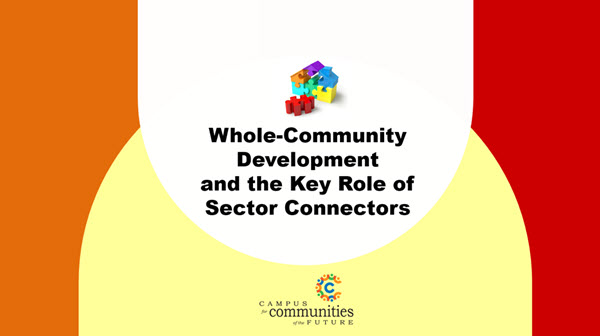The Role of Sector-Connectors: Utilizing Collective Wisdom for Whole-Community Development

In our world today, we face a web of interconnected challenges. The health of our communities is about much more than medicine and health care practitioners, it’s tied to access to clean air and water, nutritious food, and a stable income. Social equity is another piece of the puzzle. Not everyone has the same opportunities because of systemic inequalities. Then there’s the economy. It’s not just about money but how resources are distributed and whether people can find work that provides a living wage. Lastly, the environment binds these elements together. Pollution, climate change, loss of biodiversity, and violence affect health, widening social gaps, and disrupting economies.
IMPORTANCE OF LEADERS WHO THINK GLOBALLY BUT ACTION LOCALLY
Much of our collective ability to respond to today’s complexity will require a new vision for leadership. Leaders must understand global trends, such as climate change or economic shifts, and translate them into local action. This means working with local communities and neighbourhoods to address their unique challenges and strengths while keeping an eye on the bigger picture. It’s about balancing what’s good for the world with what works at home.
WHAT’s A SECTOR-CONNECTOR?
Sector-connectors are those who bridge different sectors, bringing together business, government, social purpose organizations, and most importantly, yet too often overlooked – residents/citizens - the consumers and supporters of the other three sectors. Sector-connectors are neutral convenors who bring together all four sectors to better understand that a problem in one sector affects the others. Their role is to bring these sectors together to share knowledge, resources, and ideas, creating solutions that are more effective and likely to be implemented because they’re built by the whole community.

FOUR ROLES OF SECTOR-CONNECTORS
1. Promoting systems-practice in communities
Systems-practice is about seeing the big picture. Sector-connectors use this approach to help communities tackle problems from multiple angles with different lenses and experiences. They know that fixing one part of a system can cause changes in another. So, they encourage communities to think about the whole web of relationships when they plan initiatives. The result? Innovation and transformation.
2. Facilitating community/stakeholder-led initiatives
Those who live, work, and play in their communities know their challenges and opportunities best. Rather than providing solutions, sector-connect leaders facilitate a process and spaces where everyone can speak and be heard. As a result, initiatives truly reflect the community’s desires and requirements and, most importantly, empowers them to lead.
3. Strategic anticipation of future challenges
The future is uncertain, but we can prepare for it. Sector-connectors help communities take advantage of opportunities as well as anticipate upcoming challenges such as technological changes or new regulations. Sector-connector leaders also work with the community to define their collective values and outcomes and develop flexible strategies that can adapt to changes as they emerge.
4. Maximizing digitization for effective solutions
Digital tools offer new ways to solve both old and new problems. Sector-connectors create a greater awareness and understanding of how the use of digital technologies can streamline processes, gather data, and connect people. They promote the use of these tools to make community initiatives more efficient and inclusive.
ENGAGING THE WHOLE COMMUNITY
All of the above must involve multiple sectors – (a) citizens, (b) businesses, (c) government, and (d) social purpose organizations.
(a) Engaging residents/citizens (the consumers) in decision-making
True wisdom comes from the grassroots as much as it does from the grasstops. Sector-connectors encourage direct involvement of residents in decision-making, tapping into the collective wisdom of those who live the realities of the community’s challenges and opportunities every day.
(b) Involving businesses in sustainable development
Businesses have resources and expertise that can be vital for sustainable development. Sector-connectors encourage and support the alignment of business interests with community goals. They showcase how sustainable practices can benefit both the bottom line and the broader public good.
(c) Collaboration with government for policy implementation
Government policies and funding have a significant impact on communities. Sector-connectors can act as intermediaries, contributing to government policies and funding that reflect those of the collective leadership and their promising practices. That means reversing the traditional approach of ‘policies informing practices’ to instead becoming more about ‘practices informing policies.’
(d) Partnering with the social purpose sector for impact
Nonprofits, charities, social enterprises, cooperatives, informal networks and businesses with a social purpose often drive social change. Sector-connectors help to combine their knowledge, experience, and ideas to amplify their impact and address community issues comprehensively.
CONCLUSION
Summary of the role of sector-connectors in responding to complexity
Sector-connector leadership is an emerging discipline addressing the key role of neutral catalysts who bring together and help to build trusted relationships between different parts of the community. They prioritize building interconnections to ensure social, economic, and environmental well-being. By bridging sectors and silos, they foster comprehensive, community-led development that is sensitive to both local and global contexts.
Emphasizing the value of collective wisdom in finding solutions
The power of collective wisdom and leadership cannot be overstated. When sector-connectors harness this resource, they unlock innovative and sustainable solutions that no single group could achieve alone. This collaborative spirit is the cornerstone of responsive, resilient, future-ready thriving communities.
Posted on 02-28-24Next entry: Too Tired to Lean in to the Future?
Previous entry: Are We Languishing?

 Brenda Herchmer is the owner of Grassroots Enterprises, a community development consulting company.
Brenda Herchmer is the owner of Grassroots Enterprises, a community development consulting company.